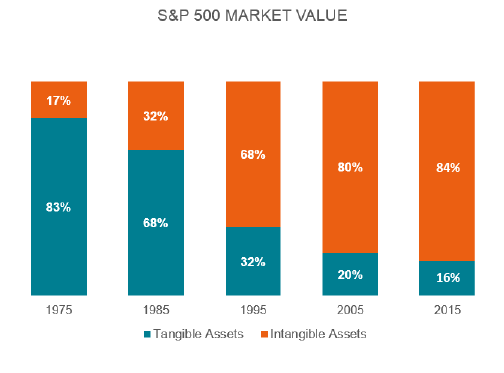In today’s ‘VUCA’ world—characterised by volatility, uncertainty, complexity and ambiguity— it is becoming harder and harder to get right. As discontinuity becomes the norm and the most established business models come under threat, business leaders may need to adapt their models or develop new ones. How can organisations achieve sustainable success in a constantly changing environment with management accounting?
Read more: Why does your business need an accounting software?
Business as usual no longer exists
Globalisation, technological development and rapid population growth are causing fundamental change to the business world. Traditional financial reporting has not kept pace with the seismic shift in macro-economic value experienced over the last 30 years, and this is reflected in balance sheets.
A study by the consulting firm Ocean Tomo concludes that intangible assets now make up more than 80% of S&P 500 market value, up from less than 20% in 1975. Another research from McKinsey finds 31% of Western companies’ profit comes from these “asset-light, idea-intensive sectors”, compared with 17% in 1999.
The following chart highlights the changing roles of tangible and intangible assets in terms of market value over time.
Reporting must evolve to address the information needs of business decision makers within this changed business dynamic. The focus has to be on disclosing not just a broader set of information but the relevant and interconnected information needed by investors, employees and other stakeholders.
Additionally, the large majority of senior business leaders find themselves battling against bureaucratic decision-making processes, siloed and short-term thinking, breakdowns in trust and collaboration inside the organisation and difficulties with translating ever-expanding volumes of information into relevant knowledge.
Read more: Improve These 5 Key Areas for Better Strategic DecisionsThe global management accounting principles
Implementing global management accounting principles can offer a solution to these challenges. An effective management accounting system helps organisations:
- Manage and utilise all available resources – tangible and intangible – to create values sustainably.
- Identify all factors – internal and external – affecting how an organisation operates in today’s hypercompetitive environment.
- Make quicker, better strategic decisions based on integrated thinking—cutting through silos to connect the relevant people and information from across the organisation.
The following special reports by CIMA (Chartered Institute of Management Accountants) and the AICPA (American Institute of Certified Public Accountants) can be the starting point for the adoption of the global management accounting principles.
Joining the Dots | Decision Making For A New Era
How can organisations make good strategic decisions quickly—and then deliver on their choices. Download the full report.
Integrated Thinking |The next step in integrated reporting
At a time when many of the practices and processes that account for a company’s assets do not adequately capture value, we urgently require a reality check for business reporting. Download the full report.
Rebooting Business | Valuing the Human Dimension
The human dimension – relationships with customers, employees, partners and communities – will be key to getting things moving again and sustaining success over the long run. Download the full report.
 English
English  Vietnamese
Vietnamese 



